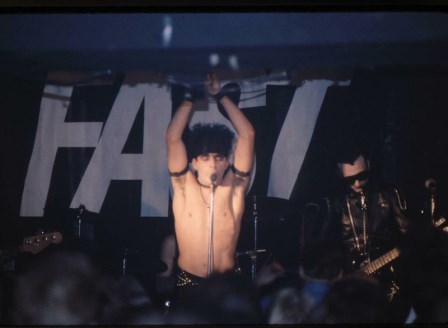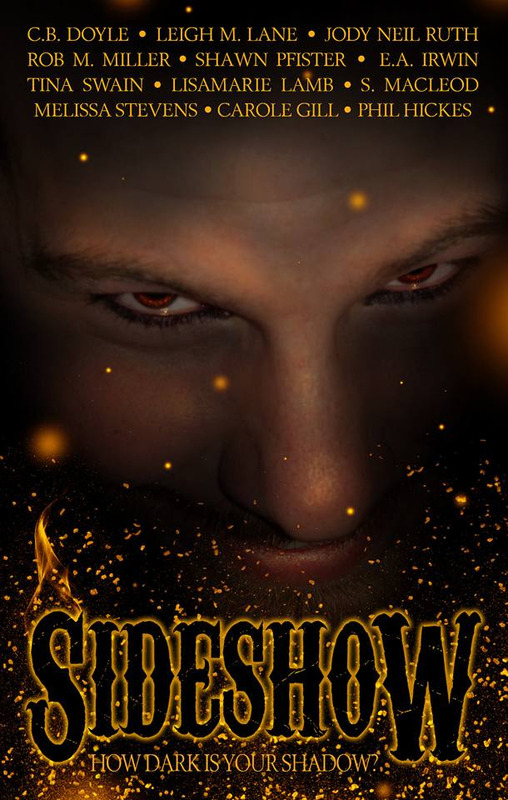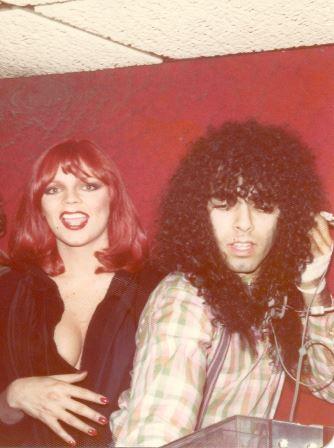
PUNK GLOBE:
You always seemed to be a step ahead of
everyone else in grade school as far as music
was concerned. How and why did you veer
so far off the mainstream musical arena at
such an early age?
Paul Zone:
You know the saying “The fish rots from the
head first”, well no offense to Miki or
Jimmy, but whether we like it or not we are
influenced by our older siblings in one way
or another. Either you rebel against older
siblings or join forces and strengthen your
path together. My brother Mandy and I were
right on track with Miki and all three of us
worked off each other’s personality and
influences. Being so close in age we
sometimes had that strange triplet thing
going on. I have thought about that question
on our path for sometime, especially when I
started writing my memoirs and it's funny I
never really discussed it with Miki or had
any sort of questioning, with him being the
oldest, about our diverse taste and what
influenced us growing up.
Miki was responsible at the very beginning
for bringing in new and obscure types of
music that weren’t from the mainstream in
the mid to late 60s and especially the early
70s. Mandy and I caught on quickly with
searching out sounds, styles and vision. Miki
has been long gone now and it's a bit too late
to try to figure out what went on in his head
after puberty or what made him make such a
drastic turn to the avantgarde
especially in
music. The turn was taken by a lot of us who
migrated to Manhattan in the early 70s
lumped together on the small underground
music scene. The New York band members
(or soon to be band members) started
gathering in the back room at Max’s Kansas
City in 1972 and then discovered the Mercer
Arts Center, moving over to the Club 82,
then to Mothers and finally landing at
CBGB and Max’s Kansas City again in
1974 through 1977. It was a very short time
from Glam to Punk and the grey area in
between, a mere 5 or 6 years in total.
Photo By: Glen Brown
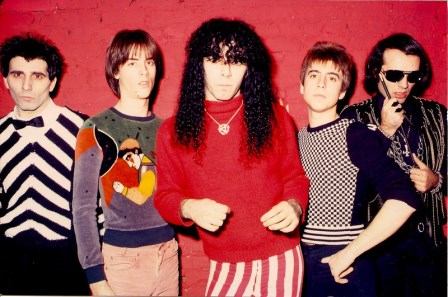
PUNK GLOBE:
The same would go for fashion...how did
you create such innovative looks and who
did you look to for inspiration?
Paul Zone:
Fashion was definitely a big part of our youth.
Right after the British invasion bands took
off their suits, that’s when it started to get
interesting. We just loved that somewhat
Victorian look 1967/68 post Mod London
style with satins, velvets, ruffled shirts and
all the stripes, checks, polka dots and so on
worn by the Who, Kinks, Stones, etc. By the
time the 60s were winding down the colorful
San Francisco acid inspired
fashion worked
at times but when it went to hippy flannel
shirts, beards and overalls we rebelled.
Thank goodness for bands that didn’t go for
that style like Rod Stewart and the Faces and
Alice Cooper who kept dressing up... and of
course the birth of Glam Rock style with our
first Glam God, Marc Bolan. We jumped on
the Glam wagon from the very start and
fashion had a lot to do with it.
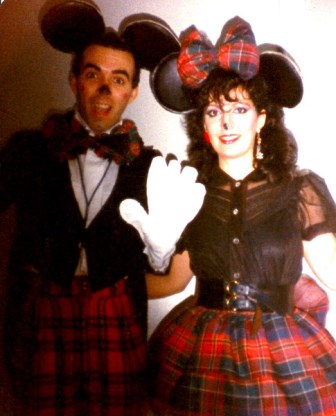
PUNK GLOBE:
During the early incarnations of the Fast,
when you were not in the band, you seemed
content to be involved in the social whirl
while taking pictures of the leading players
of the scene. Indeed, much of your book,
"Playground: Growing Up in the New York
Underground" is based on that time. During
that time, did you ever have the desire to be
a performer? Did you always know that you
could sing...and sing well?
Paul Zone:
Already being a selfproclaimed
part of the
New York Underground at 14 or 15 years
old I was experimenting with photography,
design, lighting, styling, making clothes, but
never thought of singing, very strange but
true. It was Miki who came to me one day in
1975 and told me that he wanted me as the
lead singer in The Fast due to my popularity
on the scene. Mandy was the lead
singer/keyboard player from the beginning
but Miki noticed that The Fast were not
getting the attention that the other bands
coming up were getting. He wanted to
change the style and sound of the band and
wanted me to be a part of that change. We
went into rehearsal for four months with
new songs and had our debut in June 1976 at
Max’s Kansas City.
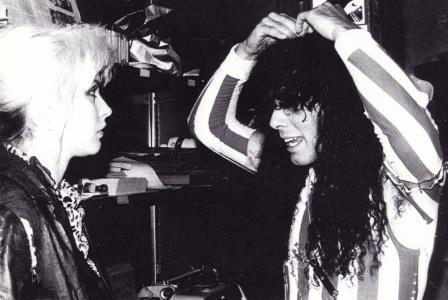
PUNK GLOBE:
Some people, myself included, feel that
the Fast were the best Power Pop band of
the Max's, CBGB's scene. The band seemed
to have all the elements necessary to achieve
super stardom perfectly
crafted pop songs,
good looks, a solid following and many top
name producers and record companies
interested. Why is it, do you think, that the
band were never signed to a major label
deal?
Paul Zone:
Peter Crowley who booked Mother’s and
was Wayne County’s manager loved the
original Fast and when he started to book
Max’s, he brought all his favorite bands
there also. He started to book the new Fast
as headliners right from the start and owner
Tommy Dean thought it would be a good
idea if he managed us. Of course we said,
sure, it’s like we were the house band but
were able to fill the place as well. Little did
we know that for the next year and a half
1976 to 1978) while most of the local bands
were signing up with major labels for their
first LPs, Mr. Dean was only offering us up
with the stipulation that they also have to
sign Max’s Kansas City records as a
subsidiary label for other acts he wanted to
own the rights to. We even recorded and did
demos with producers (Richard Gottehrer,
Denny Cordell, etc.) on the scene and they
offered to bring us to their labels but once
Mr. Dean got to negotiations it soured. All
in all bright times for The Fast continued
throughout the late 70s into the early 80s
with four single releases, touring,
productions by Ric Ocasek of the Cars and
two full length LPs, “The Fast For Sale” and
“Leather Boys From The Asphalt Jungle”.
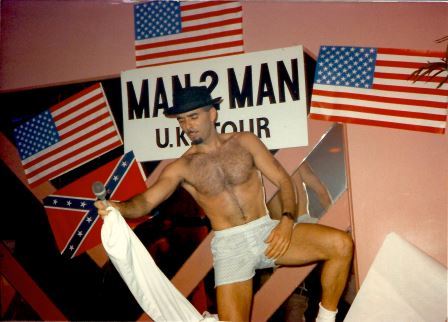
PUNK GLOBE:
After the Fast, you and your brothers
experimented with different looks and
musical genres until you eventually settled
on you and Miki becoming Man 2 Man.
How did it feel when you finally achieved
success?
Paul Zone:
Mandy left the band in 1978 and formed
Ozone and performed into the early 80s with
a few indie singles released. The Fast
continued with a changing rhythm section
until Miki and I had a short stint in 1982 at
the end of The Fast as an electronic duo with
the release of a single Moontan (with
backing vocals by you, Donna Destri). From
1982 to 1983 we perfected our sound and
style with influences that were coming in
from UK club records, German and Swiss
dance music and Bobby “O” Orlando’s
HiNrG
street sounds with Jellybean Benitez
and retro disco. Now using the name Man 2
Man we did a few demo’s with Bobby ‘O’
and finally released our first 12” single
“Hottest Of The Hot” recorded at B.C.
Studio with Martin Bisi of New York band
Material. Hottest of the Hot made all the
dance club charts and was a hit in the bigger
gay dance clubs across America. We started
to perform at venues like The Saint in NYC,
Studio One in Hollywood and major gay hot
spots crosscountry.
It went to #1 in Mexico
and we spent most of 1985 south of the
border and touring the USA. Our next 12”
single released at the beginning of 1986 was
“Male Stripper” coproduced
with New
York Electro Master Man Parrish who had a
monster N.Y. street hit with “Hip Hop Be
Bop”. “Male Stripper” became a big record
in all the gay dance clubs in the USA but
went to the #1 slot as the dance club single
in the UK and throughout Europe by the
year end 1986. In March 1987 it crossed
over to the UK pop charts and peaked at #4
and secured a spot for Man 2 Man to
perform on Top Of The Pops TV show. It
also crossed over to pop charts throughout
Europe, Mexico, South America &
Australia.
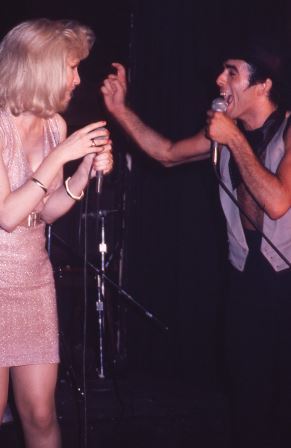
PUNK GLOBE:
You lost your brothers to AIDS and also
many friends...Do you feel any bitterness
now that HIV has essentially become a
manageable disease? Do you feel that the
administration in power during the first
wave of the AIDS crisis was negligent? Do
you feel that the current administration is
doing enough to keep AIDS awareness
alive?
Paul Zone:
Being sexually active in the early 1980s was
pretty terrifying to all of the LGBT’s &
heterosexuals. There were so many
misconceptions about what the disease was
exactly about, how it was transmitted, and
what could be done to save one’s life. What
we all learned was that there were no
answers and it seemed like everyone around
us was dying. You would hear about another
one of your friends or your friend’s friend or
an acquaintance or someone in the arts who
was close to dying, or had died without you
even knowing that they were HIV positive.
Most were never even diagnosed before they
found out that they only had weeks or
months to live. If you didn't live through it
it's hard to try and explain to someone
younger what it was like because now it is a
manageable disease and the thought of
someone dying a quick death from AIDS is
not likely. Thinking about it now is just as
heart wrenching as living it back then
because the memories that you have of what
you went through with everyone you knew
are truly heartbreaking.
When it comes to the government doing
something more rapidly about dealing with
it in 1982 or 83 and throughout the 80s, yes
it would have helped to start the battle
against HIV as soon as possible. It still
would have taken years for the medical
community to even know how to keep
people alive from a disease that the world
had never seen before.
Today we are going full speed ahead trying
to fight HIV, we do have needle exchange
programs in many states, well the ones that
fight for it and aren’t mostly governed by
Republicans. We know that safe sex
practices prevent HIV and there are drugs
now that do suppress the disease and
actually make HIV undetectable in your
blood. Some people who are not
HIVpositive
have chosen to take these
drugs daily and not practice safe sex but
taking a powerful drug, as a preventative
drug has not been proven 100% safe and
long term
effects are still not in.
Photo By: Christopher Makos
PUNK GLOBE:
You have a documentary about your book
“Playground” in the works. How did it all
come about?
Paul Zone:
When I started working on getting my
photos together and doing some gallery
shows I was already thinking of a
documentary or a book. The book deal came
first and to my surprise my publisher Marta
Hallett from Glitterati Inc. asked me to write
extended captions documenting the
photographs. I did about twenty extended
captions and she said I should take a year
and write a full biography as fifty percent of
the photo book. I knew right then and there
that a documentary wouldn’t be far off in the
future. Not only will the documentary focus
on my brothers and me, but it will also
document the Glam & Punk scene of the
1970s photographed in my book. Director
Jason Viteritti has interviewed over fifty
people so far and digitized 8mm film of me
and my brothers growing up together in the
1950s and 1960s. For some reason we were
lucky enough, in a time before video
cameras, to have filmed a lot of live
performances, interviews and music videos
of The Fast. Also featured will be live
footage, TV appearances, and music videos
of our group Man 2 Man.
Photo By: Chris Stein
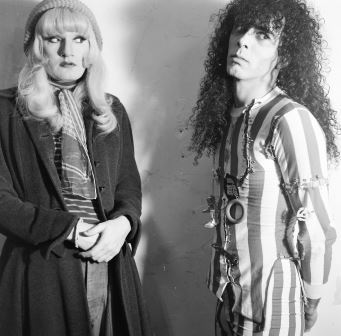
PUNK GLOBE:
Paul...how would you describe
yourself in three words?
Paul Zone:
Past, Present, Future
PUNK GLOBE:
Well, in the Quantum World these
would be all happening simultaneously...so
yeah! I like it! Paul, do you have any final thoughts for the Punk Globe Readers?
Paul Zone:
I'd like to send some love to Ginger Coyote who has been a close friend for almost forty years. We met in the late 70's and were always included in Ginger's original fanzines and magazines from the very start. Ginger is an important, innovative pioneer from way back in the first wave of American Punk from coast to coast. We should be thankful that she has kept the flames burning brightly for all of us that were there at the beginning as well as for those who need to be schooled, truthfully.


